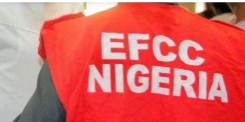
Promoters of CBEX in trouble as court empowers EFCC to go after them
CITIZENS COMPASS– Trouble awaits some promoters of the ponzi scheme, Crypto Bridge Exchange (CBEX), as an Abuja Federal High Court on Thursday, issued a warrant of arrest for the Economic and Financial Crimes Commission (EFCC) to arrest them.
The promoters have used sugar coated mouths to lure many Nigerians to invest their hard earned money into the scheme.
The accused promoters are Adefowora Abiodun Olanipekun, Adefowora Oluwanisola, Emmanuel Uko, Seyi Oloyede, Avwerosuo Otorudo and Chukwuebuka Ehirim.
FIJ had earlier exposed the first three accused as key promoters of the fraud, spotlighting their identities and roles in encouraging unsuspecting Nigerians to sign up for the pyramid scheme through different methods.
Thursday’s court order was made following an April 23 ex parte application by the EFCC to arrest and interrogate the promoters.
Explaining how investors were scammed, Fadila Yusuf, the EFCC’s legal representative, said, “Their company, ST Technologies International Limited, promoted another company Crypto Bridge Exchange (CBEX) by making adverts and luring unsuspecting members of the public to invest cryptocurrencies on the CBEX investment platform.
“The victims were made to convert their digital assets into a stable coin of USDT for onward deposit into the suspects’ crypto wallet.
“The victims were initially given full access to the platform to monitor their investment.
“Following deposits valued at over $1 billion by the victims, the CBEX investment platform became inaccessible, and they could no longer withdraw from the investments. The victims later discovered that the said scheme was a scam.”
These suspects are still at large.
The suspects would be detained by the anti-graft commission for interrogation until criminal charges are filed against them.
“The defendants are at large, and a warrant of arrest is required to bring them in for proper investigation and prosecution,” Yusuf added.
Justice Emeka Nwite, the presiding judge, considered the application meritorious.
Nwite ruled, “I have listened to the submission of learned counsel for the applicant. I have also examined the affidavit evidence and the exhibits attached, along with the written address. I am of the view, and I so hold, that the application is meritorious. Consequently, the application is granted as prayed.”







